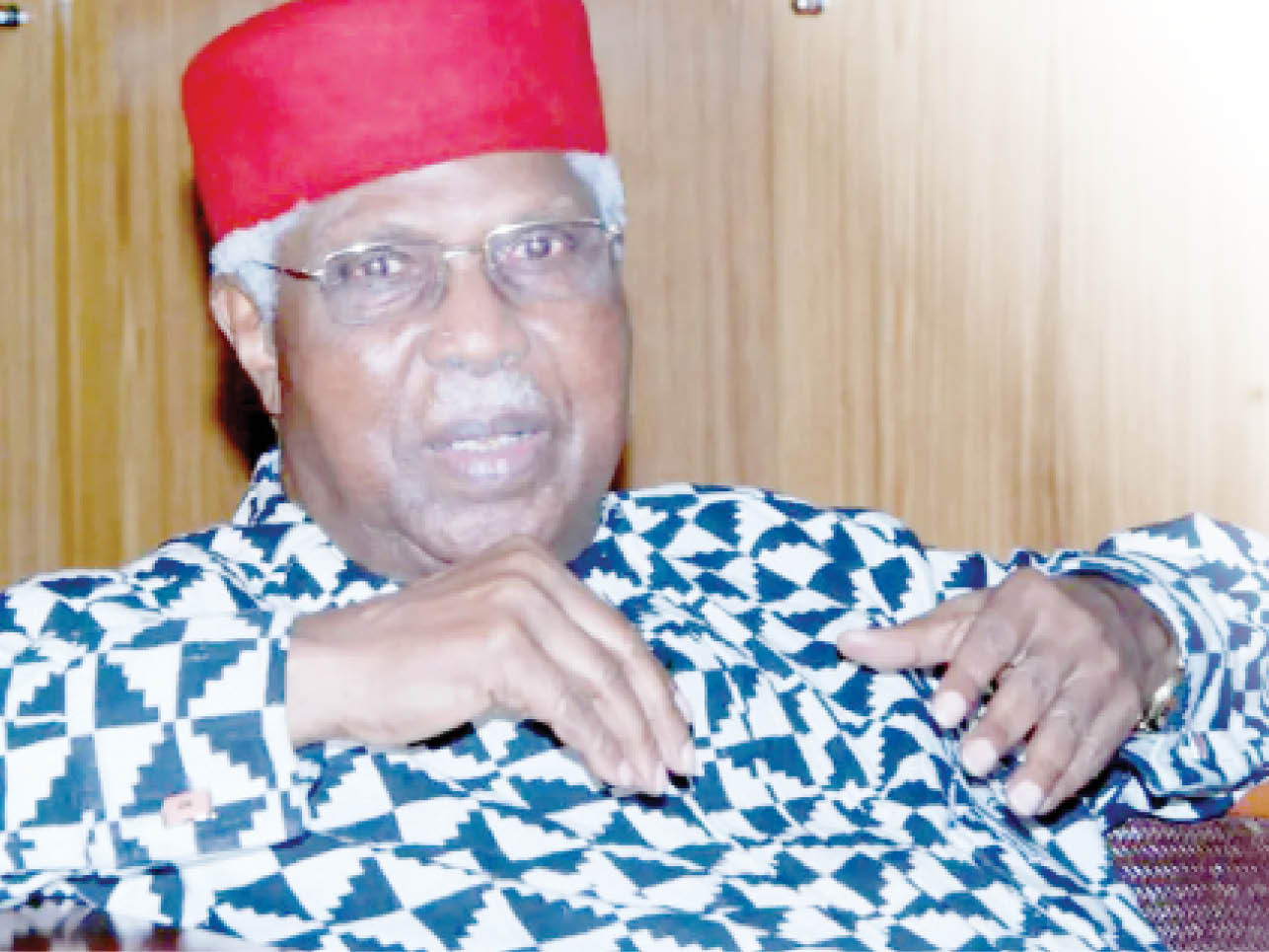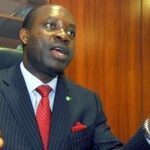He would have been 90 this October if he had lived another five years. But he never did. Dr. Alex Ifeanyichukwu Ekwueme, former Vice President of Nigeria and the legend of Nigeria’s six zone power-sharing structures, died in 2017 at the age of 85.
He was easily one of Nigeria’s greatest heroes of her nascent democracy. But for a four-year civilian interregnum (1979-1983), Nigeria was under military administration for a long time and was tired. The eagerness to have the army leave politics and government was of utmost concern to her people. But General Sani Abacha government was not in a hurry to do that and its transition program was designed to have him transmute to a civilian leader. The convoluted and confusing process provoked anger and defiance. Abacha responded by stifling voices, forced many into exile and killed others who would not let up. At some point, it was suicidal to think, speak, or act in a way suggestive of disapproval of any kind. At that instant, the regime’s reaction was always predictable.
- 23 Kaduna train abductees not exchanged with Kirikiri suspects – Prof Yusuf
- A day with Kano blind beader
Thinking less of his personal safety and with almost self-immolation consciousness, Ekwueme led a group of 34 patriotic Nigerians better known as G-34, to confront the Abacha government over its exit plan. That confrontation was perhaps one of the most daring actions ever taken against the government which until then had cowed Nigerians into resignation.
Wresting power from the vengeful junta was as frightening a job as it was risky. It was not a job any Nigerian at the time was willing to take up much less a prudent son of a Church Missionary Society (CMS) teacher, whose upbringing abhorred violence and murder. But Ekwueme was past caring and had defied the guns in defense of truth.
When in 1983, he was seized by the military in a palace coup, marched off to Kirikiri Maximum Prison and was held for two years as against his boss President Shagari who was under house arrest, he was unfazed. He took everything in his stride and carried on with poise. Until, the Justice Uwaifo tribunal set by the military government of Major General Muhammadu Buhari returned a verdict of no-guilt on him, insisting he came out of government poorer than he went in, many Nigerians did not know that Ekwueme was rich enough to play hosts to the lords as he so desired.
Apart from being rich prior to entering politics, Ekwueme was an architect of international renown with a bag of degrees to his credit. An alumnus of King’s College, Lagos, he obtained a degree in Architecture and City Planning from the University of Washington with a Masters in Urban Planning. He had a Doctoral degree in Architecture from University of Strathclyde, United Kingdom while earning degrees in History, Sociology, Philosophy and Law from University of London. He was one of the foremost Igbo who lost substantial number of properties in Port Harcourt to the Abandoned Properties Implementation Committee headed by retired Brigadier David Mark.
Writing about the inglorious Decree that birthed the Abandoned Properties Implementation Committee in his book – From State House to Kirkiri – he recalled how General Obasanjo on September 28, 1978, just two days to the end of his tenure as military Head of State, promulgated Decree 90 which “legalized the sales of abandoned properties carried out by (David Mark’s) Abandoned Properties Implementation Committee, indemnified the Committee members and protected them from any suit or proceedings in respect of their conduct as Committee members and ousted the jurisdiction of the court from enquiring into the constitutionality or otherwise of the sales”.
Confrontation with the Abacha’s regime over its unending transition to civil rule was fraught with danger, but the G-34 members led by Ekwueme were determined to fight on. The death of Abacha on June 8, 1998, was to draw the curtain on the transmutation plot. The G-34 with few other groups formed the People Democratic Party in readiness for the general election that followed. Ekwueme became the new party’s first chairman and later chairman, Board of Trustees (BoT) while Professor Jerry Gana became the national secretary. Recall that during the Second Republic, he was also the chairman of the National Party of Nigeria at inception and the party’s first chairman, Board of Trustees (BoT). It is important to mention here that Ekwueme held both offices with dignity and candor, respecting its principles of fairness and equity.
Sadly, the violation of these principles which confronts the party to this day and which may ruin its chances at the February 2023 election, started with the Jos convention of the party. Contrary to the expectations that Ekwueme would emerge as the PDP’s presidential candidate for the election, ex-Head of State, General Olusegun Obasanjo who was doing time in Yola prison for opposing Abacha was hurriedly released from prison and foisted him on the party as its flag bearer. The conspiracy that foisted Obasanjo and denied Ekwueme was not different from the one which overthrew the Shagari/Ekwueme government in 1983 in order to ensure he did not succeed Shagari as president.
Ekwueme was a rare gift to his generation. His contributions to the development of the country, evident in the number of things he did helped to stabilize her. His 1995 contributions to the Constitutional Conference which advocated for power rotation to the six zones of South-east, South-south, South-west, North-west, North-east and North-central has remained till date the best antidote against power imbalance. Sadly, there is concerted effort by few unscrupulous politicians to manipulate the arrangement and render it impotent. As a matter of fact, the biggest problem confronting the PDP today is its shabby handling of the Ekwueme principle of rotating electoral/party offices among the component zones. The party appears determined to violate the principle even at the cost of its electoral victory. Few politicians of today have Ekwueme’s pertinacious and single-minded pursuit of public good. His accomplishments were many, including the seminal works done by his architectural firm Ekwueme Associates, Architects and Town Planners, which he formed in 1956, especially in the area of architectural designs, urban planning and renewal. To his eternal credit, most cities in Nigeria have an imprimatur of Ekwueme’s planning and architectural influences like the Federal Capital Territory (FCT) and a few state capitals and edifices.
Because of his many positive contributions to humanity, he was widely acknowledged and honoured. In recognition of some of his efforts, the federal government honoured him with national honours of the Grand Commander of the Order of the Niger (GCON) and renamed the Federal University, Ndufu-Alike, Alex Ekwueme Federal University (AE-FUNAI), a year after his death. The great son of Oko, Orumba North Local Government Area of Anambra State, who was born in Uga, Aguata LGA on October 21, 1932, to an itinerant Church Missionary Society (CMS) teacher father would have been 90 this October if he had “tarried”. It is providential that his posthumous birthday came at a time of national uncertainty as the country wobbles to a consequential general election.
It is hoped that the Nigerian political class will learn some lessons from Ekwueme’s legacy of values and political philosophy.
Sadik Umar, a public commentator, writes from the Ahmadu Bello University, Zaria

 Join Daily Trust WhatsApp Community For Quick Access To News and Happenings Around You.
Join Daily Trust WhatsApp Community For Quick Access To News and Happenings Around You.